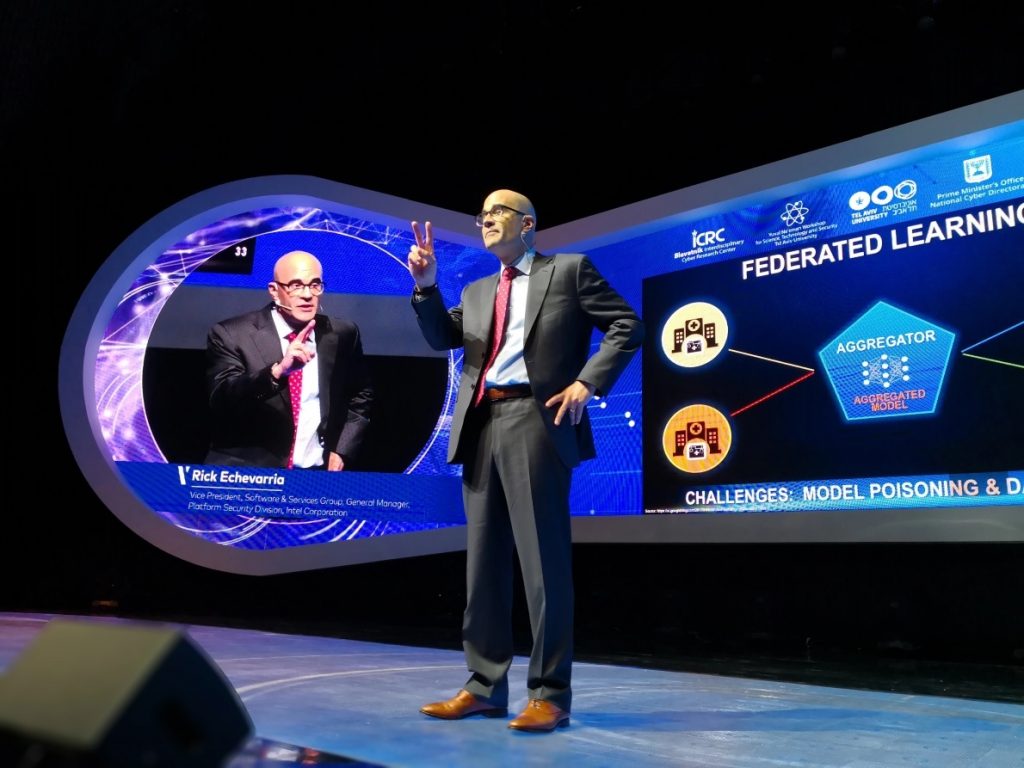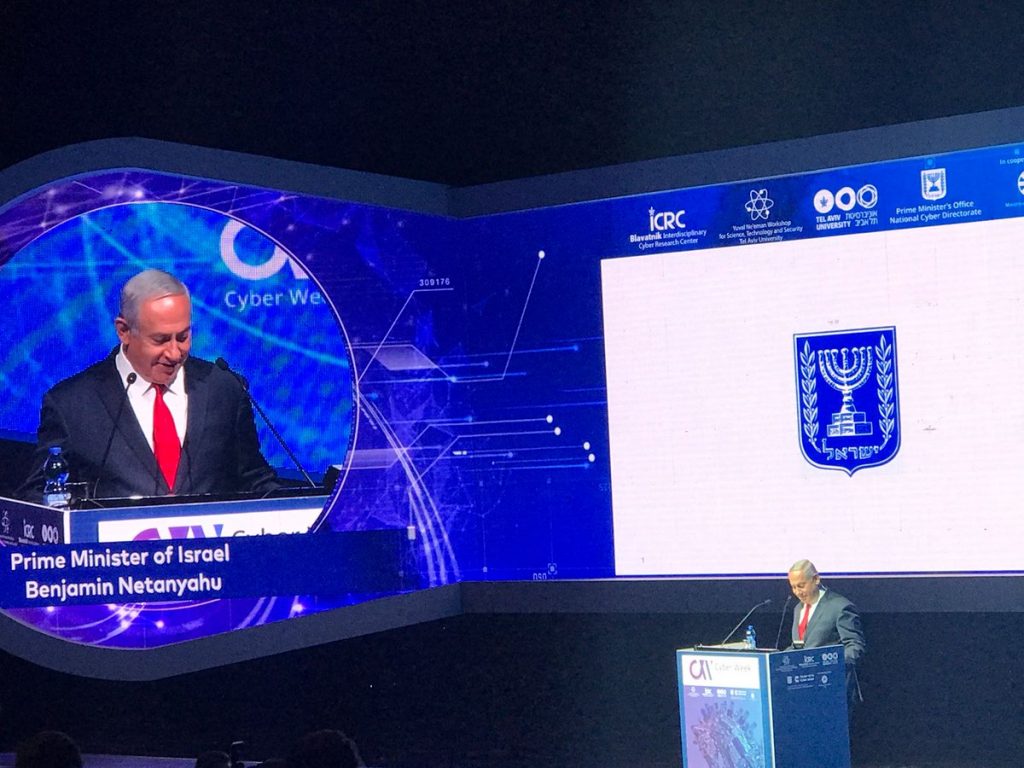The fourth day of the 8th annual 2018 Cyber Week conference at Tel Aviv University, a global event gathering leading cybersecurity researchers, entrepreneurs, and insiders, began with a threat.
Israeli Prime Minister Benjamin Netanyahu, a main speaker at the five-day event, took to the stage on Wednesday and aired an audio clip announcing a large-scale hack to an audience of some 8,000 attendees from 85 countries.
“Ladies and gentlemen,” the robotic voice said, “this conference has just been hacked. Ironic, isn’t it? A conference dedicated to cybersecurity being hacked.”
“We are based in a country not far from Israel. That’s all you need to know for now. The bank accounts of everyone sitting in this hall have just been frozen. The intellectual property of your companies is in our hands, so are your private conversations. This information is being sent to your competition and your enemies,” it went on.
The polite hacker signed off with a “have a nice day.”
SEE ALSO: Israel Is a Small Country, But A Cyber Superpower, Says Ex-CIA Director At CyberTech 2018
The threat was not real; Netanyahu was simply trying to drive home a point. “This is not far-fetched,” he said, warning that hackers and state-backed actors “can do everything that you heard here and much more.”
“They can cripple our most sensitive systems. They can even take over, literally take over, some of those vital systems. And it is not something that is theoretical in the future. It’s already happening in the present, as you well know. You wouldn’t be here. You wouldn’t have companies. There wouldn’t be this thriving business if there wasn’t this amazing threat to our banks, our airplanes, even our weapons,” Netanyahu said.
The prime minister cautioned that while there may not be a “silver bullet” or a “solution that stops hermetically any country or even the majority of attacks,” the world should “combine forces” to counter cybersecurity threats. “The only way we can address this enormous challenge…is to keep running ahead, to be ahead.”
“This is a supreme test for our civilization. It is going to be be tested not only by criminal organizations, by terrorists, but by other states,” he said. “This is why we’re holding this cyber conference here. It is to protect the present and ensure the future, no less than that.”
Netanyahu also praised the cybersecurity ecosystem in Israel, saying the country is “punching at 200 times above our weight here.”
Israel’s reputation as a world leader in cybersecurity is well established. Earlier this year, former CIA director Gen (Ret) David H. Petraeus labeled Israel a “cyber superpower” and a desired partner for collaboration worldwide, during an address at the annual CyberTech conference in Tel Aviv in January.
Indeed, Israel is home to the second-largest number of cybersecurity deals globally in recent years, according to an April 2018 report compiled by New York data firm CB Insights.
According to Netanyahu, Israel is the recipient of 20 percent of all global private investments in cybersecurity. In 2017, Israeli cybersecurity firms raised a record $814.5 million in 81 deals both in venture capital funds and private equity, and exits brought in a total of $1.4 billion, according to a January 2018 report on Israel’s cyber sector by Start-Up Nation Central. There are also a recorded 474 active cybersecurity startups and companies currently operating in Israel, seven of them founded just this year.
In his address on Wednesday, the prime minister said that the new Cyber Security Complex in the southern Israeli city of Beersheba would boost cooperation across agencies and he hopes it will become a leading global authority on cybersecurity.
Sign up for our free weekly newsletter
Subscribe“There is an idea here – within 200 meters you can have military, academia, and business talk to each other. This idea has profound benefits because minds fertilize each other when they meet. Still in the digital age meeting and talking has tremendous advantages,” Netanyahu said.
Nevertheless, he acknowledged the possible consequences. “There’s also a risk involved. Always a risk. The risk is a security risk, especially vis-a-vis our military applications or security applications that involve state security, but I’m willing to take on that risk because I believe cybersecurity grows through cooperation.”
This risk-taking is characteristic of the Israeli cybersecurity development. In an interview with NoCamels, Israel Aerospace Industries representative Tomer Mey-Tal expressed his belief that Israel is a resilient nation in the face of challenges. When the country identified cybersecurity as a potential threat, individuals immediately contributed to finding solutions to ensure the safety of cyberspace, he said.
Notably, the evolution of the National Cyber Directorate from the Israel Security Agency in 2016 has strengthened the safeguarding the nation’s cyber framework.
During his address at Cyber Week, Director-General of the Israel National Cyber Directorate Yigal Unna explained Israel’s three-layered approach including market robustness, systemic resilience and national defense. These approaches all stem from the directorate’s overall strategy of integrating technical and political methods into one operational unit to build the capacity of Israel’s cyber-defense. Future objectives of the organization include further academic research, investment in human capital and positioning the nation as a global hub for digital security, he noted.
Unna and other speakers also echoed the difficulty of finding a single solution, as Netanyahu outlined. In his speech, Unna highlighted the growing trend of multidimensional cyberattacks and the use of the most advanced technologies. These threats often employ foreign countries seeking to advance political agendas, he said, noting a greater need for government and cybersecurity agency cooperation to ensure the security of online networks.
Other speakers at Cyber Week included the head of Israel’s Internal Security Agency (Shin Bet), Nadav Argaman, former Israeli PM and minister of defense Ehud Barak, as well as a number of representatives from global leading tech companies such as IBM, Microsoft, and Intel. Founders and CEOs of Israeli cybersecurity companies were also on hand for panels and discussions including CheckPoint founder and CEO Gil Shwed, the 2018 recipient of the first-ever Israel Prize for innovation and high-tech, Cybereason co-founder Yossi Naar, whose company raised $100 million last year, and Team8 CEO and co-founder Nadav Zafrir, a former commander of the Israeli military’s Intelligence Corps Unit 8200.
During the event, Rick Echevarria, Vice President, Software and Services Group General Manager, Platforms Security Division at Intel, said the company has been “dedicated to delivering world changing technology, which many of you know were right here in Israel.”
Intel is considered the largest employer in the Israeli tech sector, with about 11,000 employees in Israel and another 1,000 from Jerusalem-based Mobileye, which it acquired last year for $15.3 billion. Last month, the multinational corporation and chipmaker giant submitted plans to nearly double its manufacturing operations in Israel, and invest some $5 billion over the next two years.

Rick Echevarria, Vice President, Software and Services Group General Manager, Platforms Security Division at Intel, at Cyber Week 2018. Courtesy
Echevarria on Wednesday also announced two new partnerships with Israeli cybersecurity startups Duality Technologies, a company that arose out of the Team8 incubator, a leading cybersecurity think tank that has born several high-profile companies in the cyber sphere and Enigma.
SEE ALSO: TASE, Intel, The Floor Partner For First Blockchain-Based Securities Lending Platform
“Intel researchers are making great strides toward practical methods for homomorphic encryption, a method that will allow computer systems to perform calculations on encrypted information without first decrypting,” he wrote in a post. “Duality is collaborating with Intel to explore the security challenges of AI workloads using homomorphic encryption on Intel platforms.”
The collaboration with Enigma, which developed a unique privacy protocol that uses Intel® SGX to protect data, Echevarria said, will include joint work to integrate this functionality for private smart contracts on the Ethereum public ledger.
Last month, Intel also teamed up with the Tel Aviv Stock Exchange, Israeli fintech hub The Floor, and global management consulting company Accenture for a first-of-its-kind Blockchain-based new securities lending platform aimed at revolutionizing the securities lending market in Israel.
Related posts

Editors’ & Readers’ Choice: 10 Favorite NoCamels Articles

Forward Facing: What Does The Future Hold For Israeli High-Tech?

Impact Innovation: Israeli Startups That Could Shape Our Future





Facebook comments